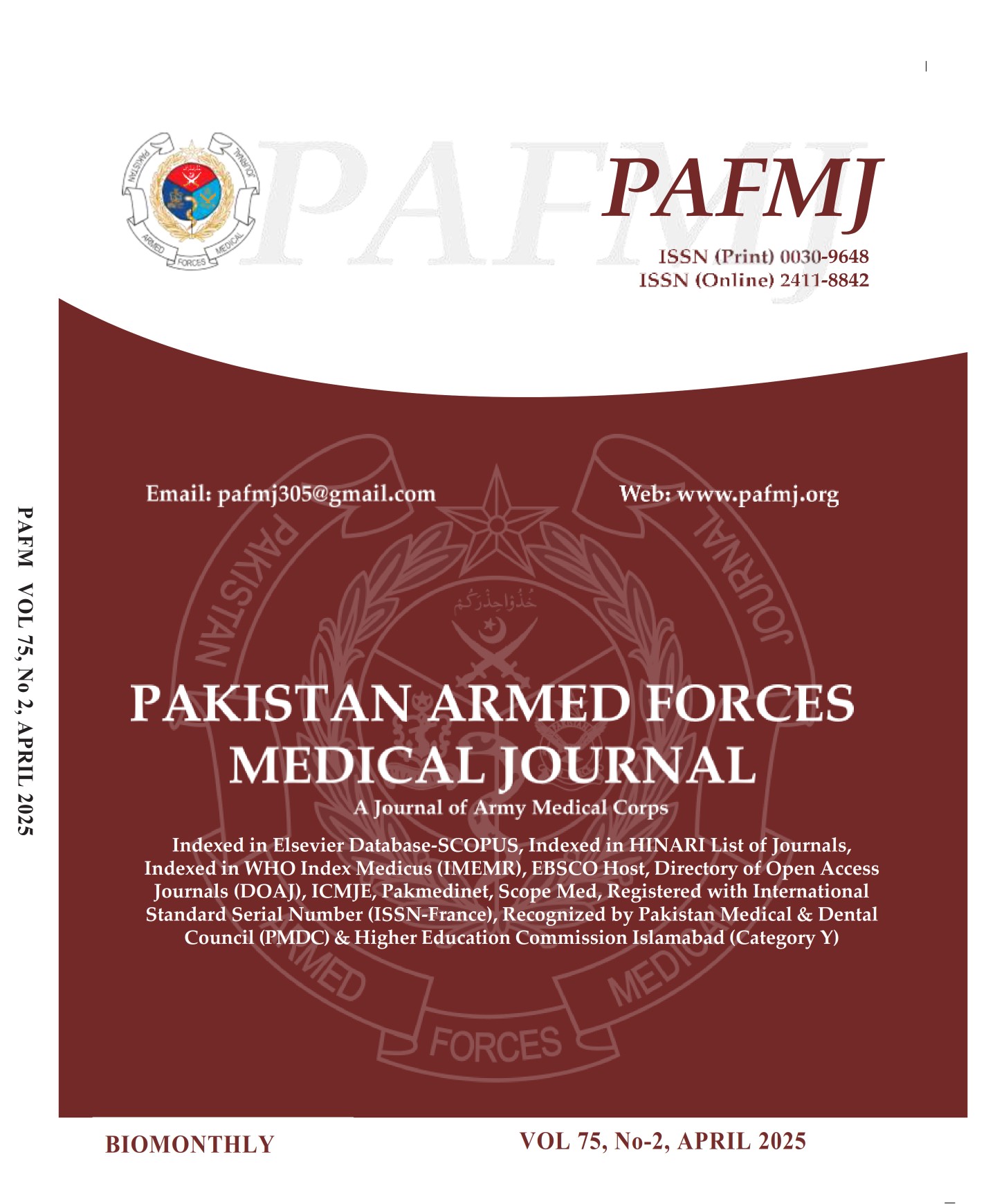Efficacy of Variable versus Fixed-Rate Infusion of Phenylephrine during Caesarian Section: a study from Rawalpindi, Pakistan
DOI:
https://doi.org/10.51253/pafmj.v75i2.8738Keywords:
Caesarian Section, Hypotension, Phenylephrine, Spinal AnesthesiaAbstract
Objective: To compare the efficacy of variable and fixed-rate infusion regimens of phenylephrine in prophylaxis of maternal hypotension during elective Cesarean section.
Study Design: Quasi-experimental study
Place and Duration of Study: Department of Obstetrics and Gynecology at the Pak Emirates Military Hospital (PEMH) Rawalpindi, Pakistan from Feb to Jul 2021.
Methodology: Study included 94 pregnant women all of whom were planned to undergo non-emergent Caesarian section at ≥37 weeks of gestation. Those who were >35 years old or had any history of medical comorbidities were excluded from the study. A fixed infusion regimen was injected to Group-A (n=47) at a continuous rate of 0.75µg/kg/minute, while Group-B (n=47) received a variable phenylephrine dosage, starting at 0.75µg/kg/minute which was increased to 0.9µg/kg/minute in case of hypotension, or reduced to 0.4µg/kg/minute in event of reactive hypertension. Furthermore, 100µg bolus was given if hypotension was noted intraoperatively. Any incidence of hypotension or other adverse events was recorded.
Results: Mean age for variable infusion and fixed infusion groups were 24.6±4.7 and 26.2±4.6 years respectively. Both the groups exhibited a significant role of phenylephrine in hypotension prophylaxis. A slightly lower incidence of hypotension was observed during fixed rate infusion (25.5%) as compared to the variable rate (38.3%). No significant intergroup variability was reported (p=0.954). Headaches and nausea/vomiting were the most prevalent postoperative complaints, with a slightly higher incidence in the variable rate group.
Conclusion: Both variable and fixed rates of phenylephrine infusion yielded a similar outcome during spinal anesthesia in elective C-section.
Downloads
References
Lee AJ, Smiley RM. Phenylephrine infusions during cesarean section under spinal anesthesia. Int Anesthesiol Clin 2014; 52(2): 29-47.
https://doi.org/10.1097/AIA.0000000000000010
Ferré F, Martin C, Bosch L, Kurrek M, Lairez O, Minville V. Control of Spinal Anesthesia-Induced Hypotension in Adults. Local Reg Anesth 2020; 13: 39-46. http://doi.org/10.2147/LRA.S240753
Rebet O, Andremont O, Gérard JL, Fellahi JL, Hanouz JL, Fischer MO. Preload dependency determines the effects of phenylephrine on cardiac output in anaesthetised patients: A prospective observational study. Eur J Anaesthesiol 2016; 33(9): 638-644.
https://doi.org/10.1097/EJA.0000000000000470
Hofhuizen C, Lemson J, Snoeck M, Scheffer GJ. Spinal anesthesia-induced hypotension is caused by a decrease in stroke volume in elderly patients. Local Reg Anesth 2019; 12(1): 19-26.
http://dx.doi.org/10.2147/LRA.S193925
Ferré F, Marty P, Bruneteau L, Merlet V, Bataille B, Ferrier A, et al. Prophylactic phenylephrine infusion for the prevention of hypotension after spinal anesthesia in the elderly: a randomized controlled clinical trial. J Clin Anesth 2016; 35: 99-106.
https://doi.org/10.1016/j.jclinane.2016.07.020
Heesen M, Kölhr S, Rossaint R, Straube S. Prophylactic phenylephrine for caesarean section under spinal anaesthesia: systematic review and meta-analysis. Anaesthesia 2014; 69(2): 143-165. https://doi.org/10.1111/anae.12445
Siddik-Sayyid SM, Taha SK, Kanazi GE, Aouad MT. A randomized controlled trial of variable rate phenylephrine infusion with rescue phenylephrine boluses versus rescue boluses alone on physician interventions during spinal anesthesia for elective cesarean delivery. Anesth Analg 2014; 118(3): 611-618.
https://doi.org/10.1213/01.ane.0000437731.60260.ce
Hasanin A, Habib S, Abdelwahab Y, Elsayad M, Mostafa M, Zayed M, et al. Variable versus fixed-rate infusion of phenylephrine during cesarean delivery: a randomized controlled trial. BMC Anesthesiol 2019; 19(1): 197.https://doi.org/10.1213/01.ane.0000437731.60260.ce
Shrestha B, Dunn L. The declaration of helsinki on medical research involving human subjects: A review of seventh revision. J Nepal Health Res Counc 2019; 17(4): 548-552.
https://doi.org/10.33314/jnhrc.v17i4.1042
Allen TK, George RB, White WD, Muir HA, Habib AS. A double-blind, placebo-controlled trial of four fixed rate infusion regimens of phenylephrine for hemodynamic support during spinal anesthesia for cesarean delivery. Anesth Analg 2010; 111(5): 1221-1229.
https://doi.org/10.1213/ANE.0b013e3181e1db21
Alimian M, Mohseni M, Safaeian R, Faiz SH, Majedi MA. Comparison of hydroxyethyl starch 6% and crystalloids for preloading in elective caesarean section under spinal anesthesia. Med Arch 2014; 68(4): 279-281.
https://doi.org/10.5455/medarh.2014.68.279-281
Van de Velde M. Low-dose spinal anesthesia for cesarean section to prevent spinal-induced hypotension. Curr Opin Anesthesiol 2019; 32(3): 268-270.
https://doi.org/10.1097/ACO.0000000000000712
Habib AS. A review of the impact of phenylephrine administration on maternal hemodynamics and maternal and neonatal outcomes in women undergoing cesarean delivery under spinal anesthesia. Anesth Analg 2012; 114(2): 377-390.
https://doi.org/10.1213/ANE.0b013e3182373a3e
Wang X, Mao M, Zhang SS, Wang ZH, Xu SQ, Shen XF. Bolus norepinephrine and phenylephrine for maternal hypotension during elective cesarean section with spinal anesthesia: a randomized, double-blinded study. Chinese Med J 2020; 133(05): 509-516. https://doi.org/10.1097/CM9.0000000000000621
Choudhary M, Bajaj JK. Study Comparing Phenylephrine Bolus and Infusion for Maternal Hypotension and Neonatal Outcome during Cesarean Section under Spinal Anesthesia. Anesth Essays Res 2018; 12(2): 446-451.
https://doi.org/10.4103/aer.AER_23_18
Kumar N, Jacob M, Taank P, Singh S, Tripathi N. Clinical comparison of prophylactic phenylephrine infusion vs. bolus regimens on maternal hemodynamics and neonatal outcomes during cesarean section. J Obstet Anaesth Crit Care 2020; 10(2): 118-122.
https://doi.org/10.4103/joacc.JOACC_43_20
Ngan Kee WD, Khaw KS, Ng FF. Prevention of hypotension during spinal anesthesia for cesarean delivery: an effective technique using combination phenylephrine infusion and crystalloid cohydration. Anesthesiology 2005; 103(4): 744-750.
https://doi.org/10.1097/00000542-200510000-00012
Ansari T, Hashem MM, Hassan AA, Gamassy A, Saleh A. Comparison between two phenylephrine infusion rates with moderate co-loading for the prevention of spinal anaeshtesia-induced hypotension during elective caesarean section. Middle East J Anaesthesiol 2011; 21(3): 361-366.
Xu C, Liu S, Qian D, Liu A, Liu C, Chen Y, et al. Preventive intramuscular phenylephrine in elective cesarean section under spinal anesthesia: A randomized controlled trial. Int J Surg 2019; 62: 5-11. https://doi.org/10.1016/j.ijsu.2018.12.014
Downloads
Published
Issue
Section
License
Copyright (c) 2025 Shahzada Irfan, Khan Muhammed Yaqub, Bilal Yasin, Muhammad Shahzad Bashir, Mansoor Hussain, Mirza Hamid Beg

This work is licensed under a Creative Commons Attribution-NonCommercial 4.0 International License.















